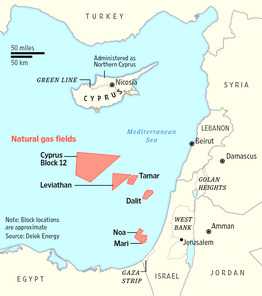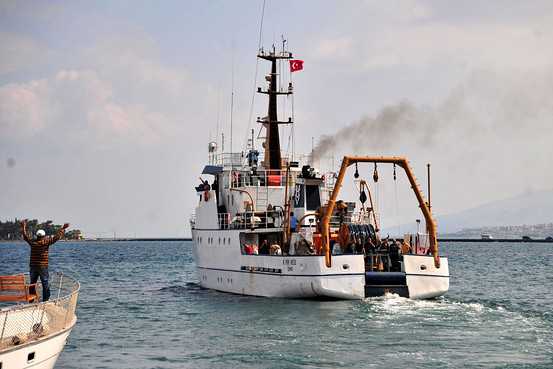By MARC CHAMPION
 ISTANBUL—Turkey said it was ready to send warships to escort research vessels that would explore for oil and gas off the coast of Northern Cyprus, responding to what it said was a provocation by the island’s Greek Cypriot south.
ISTANBUL—Turkey said it was ready to send warships to escort research vessels that would explore for oil and gas off the coast of Northern Cyprus, responding to what it said was a provocation by the island’s Greek Cypriot south.
Monday’s saber-rattling came as Texas-based Noble Energy Inc. began exploratory drilling farther south between Cyprus and Israel late Sunday, despite Turkish warnings to halt the project, the semiofficial Cyprus News Agency reported. Noble was operating under license from the Republic of Cyprus, the island’s internationally recognized government in the Greek Cypriot south.
The developments raised the stakes in a dispute over drilling rights around the divided island.
Turkish leaders say the Republic of Cyprus shouldn’t drill for oil and gas on the continental shelf that it delineated with Israel in an agreement last year. Any drilling or maritime agreements, Ankara says, should wait until the island—divided since 1974, when Turkey invaded Cyprus in response to a Greek-backed coup—is reunified, so both the Greek and Turkish populations can benefit.
Turkish Energy Minister Taner Yildiz on Monday described the Cypriot exploration project as “a political provocation aimed at consolidating the Greek Cypriot administration’s status,” and so short-circuiting reunification talks for the island, Turkey’s state Anadolu news agency reported.
Mr. Yildiz also reiterated a Turkish warning that it would make its own agreement with the de facto government of Northern Cyprus to delineate the continental shelf north of the island, if Noble Energy were to proceed with its drilling plans. Ankara would then authorize the Turkish Petroleum Corp. to send research vessels to begin exploration in the Turkish and Turkish-Cypriot waters, he said.
“The research will be carried out together with a [navy] escort,” Anadolu reported Mr. Yildiz as saying.
The Republic of Cyprus is a European Union member state, but isn’t recognized by Turkey. By contrast, Turkey is the only country to recognize the administration of the government of the island’s ethnic-Turkish North. The two sides are divided by a United Nations-monitored green line.
Ankara’s threat of military action came on the heels of similar threats Turkey made in recent weeks to send naval vessels to escort future aid convoys that attempt to break Israel’s naval blockade of Gaza. Those combative policies risk confrontation with Cyprus and Israel, as well tensions with the EU and Washington, diplomats said, noting that Cyprus is an EU member and Noble Energy is a U.S. company.
A spokeswoman for the European Union’s foreign-affairs service said Monday in Brussels that the EU urged “Turkey to refrain from any kind of threat or sources or friction or action” that could damage relations in the neighborhood or border settlement talks.
Officials at the Energy Service of the Republic of Cyprus ministry for Commerce, Industry and Tourism didn’t return phone and email requests to comment. A spokesman for Noble Energy didn’t return calls seeking comment.
Noble Energy is also involved in developing Israel’s Leviathan field, which contains an estimated 16 trillion cubic feet, or about 453 billion cubic meters, of natural gas. Noble’s partner in that project, Israel’s Delek Drilling LP, has applied to the Greek Cypriot government to activate an option to take a 30% share in the Cypriot exploration license, too, said a senior industry executive familiar with the project.
“The main reason Turkey is reacting so strongly is that it wants to be the gateway for any new gas to come to EU markets,” the executive said. A major Greek Cypriot find would undermine that goal, he said, as Cyprus would then export gas to the EU via Greece.
Selcuk Unal, spokesman for Turkey’s foreign ministry, dismissed that claim as “childish,” saying Turkey was already an energy hub. “The question here is why now? Why are the Cypriots hurrying to start drilling now? They could have done it years ago. The reason is that it coincides with a crucial moment in reunification negotiations, which is why we find that this is all a provocation,” he said.
Turkey has sought to force the pace in Cyprus’s reunification talks lately, threatening to freeze relations with the EU if reunification hasn’t been agreed upon by the time Cyprus takes over the bloc’s rotating presidency in the second half of 2012. Mr. Yildiz repeated that warning on Monday.
Write to Marc Champion at [email protected]
Corrections & Amplifications
An earlier version of this story incorrectly named Noble Energy Inc. as Noble Engineering Inc.
via Turkey Rattles Saber Over Cyprus Oil Drilling – WSJ.com.





 ISTANBUL—Turkey said it was ready to send warships to escort research vessels that would explore for oil and gas off the coast of Northern Cyprus, responding to what it said was a provocation by the island’s Greek Cypriot south.
ISTANBUL—Turkey said it was ready to send warships to escort research vessels that would explore for oil and gas off the coast of Northern Cyprus, responding to what it said was a provocation by the island’s Greek Cypriot south.
 Turkey and northern Cyprus are planning to sign an agreement to draw an exclusive economic zone in the Mediterranean Sea and invite foreign companies for gas and oil exploration, in retaliation to Greek Cyprus’ scheduled drillings set for October.
Turkey and northern Cyprus are planning to sign an agreement to draw an exclusive economic zone in the Mediterranean Sea and invite foreign companies for gas and oil exploration, in retaliation to Greek Cyprus’ scheduled drillings set for October.